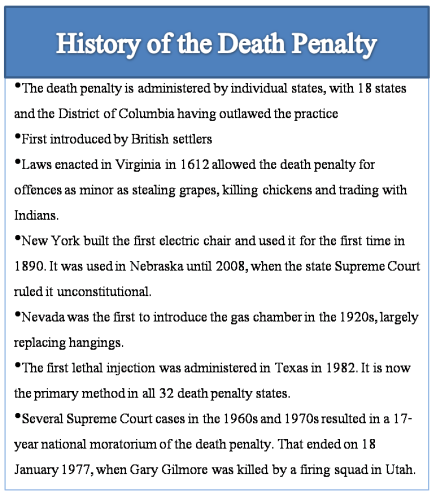
Capital Punishment or Death Penalty in the USA is a leagal sentence in 32 States and the federal civilian and military legal systems

The methods of execution and the crimes subject to the death penalty
vary by state and have changed over time
Capital punishment was suspended in the United States from 1972 through
1976 primarily as a result of the Supreme Court's decision in Furman Vs Georgia
In this case, the court found that the death penalty was being imposed in an unconstitutional manner, on the grounds of cruel and unusual punishment in violation of the Eighth Amendment to the US Constitution
The Supreme Court has never ruled the death penalty to be per se unconstitutional.
In Furman Vs Georgia, the SC
considered a group of consolidated cases. The lead case involved an
individual convicted under Georgia's death penalty statute, which
featured a "unitary trial" procedure in which the jury was asked to
return a verdict of guilt or innocence and, simultaneously, determine
whether the defendant would be punished by death or life imprisonment.In a five-to-four decision, the Supreme Court struck down the impositions of the death penalty in each of the consolidated cases as unconstitutional. The five justices in the majority did not produce a common opinion or rationale for their decision, however, and agreed only on a short statement announcing the result.
Since capital punishment was reinstated in 1976, 34 States have performed executions.
The most common method since
1976 has been Lethal Injection
Usage of lethal injection for executions in the United States
Color key:
Color key:
State uses only this method
State uses this method primarily but has secondary methods
State has never used this method
State once used this method, but no longer does
| Method | Date | State | Convict |
|---|---|---|---|
| Electrocution | Jan 16, 2013 | Virginia | Robert Gleason |
| Firing squad | Jun 18, 2010 | Utah | Ronnie Lee Gardner |
| Lethal gas | Mar 3, 1999 | Arizona | Walter LaGrand |
| Hanging | Jan 25, 1996 | Delaware | William Bailey |
The District of Columbia and the following 18 states currently do not have an enforceable death penalty statute
| State | Abolition Date |
|---|---|
| 1957 | |
| 2012 | |
| 1957 | |
| 2011 | |
| 1965 | |
| 1887 | |
| 2013 | |
| 1984 | |
| 1846 | |
| 1911 | |
| 2007 | |
| 2009 | |
| 2007 | |
| 1973 | |
| 1984 | |
| 1964 | |
| 1965 | |
| 1853 |
The United States territory of Puerto Rico has no death penalty. Puerto Rico instituted a four-year moratorium on the death penalty in 1917. The last execution took place in 1927, and the Puerto Rican Legislature abolished the death penalty in 1929
The SC has placed two major restrictions on the use of the death penalty
First, the case of Atkins Vs Virginia, decided on June 20, 2002,held that the execution of mentally retarded inmates is '' cruel and unusual punishment" prohibited by the Eightth Amendment Generally, a person with an IQ below 70 is considered to be mentally retarded. Prior to this decision, between 1984 and 2002, forty-four mentally retarded inmates had been executed in the USA
Second, in 2005, the SC's decision in Roper Vs Simmons abolished executions for persons under the age of 18 at the time of the crime
No comments:
Post a Comment